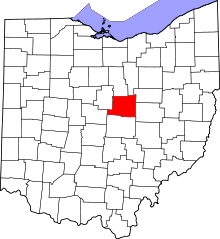Monroe Township, Knox County, Ohio
| Monroe Township, Ohio | |
|---|---|
| Township | |
 Location of Monroe Township in Knox County. | |
| Coordinates: 40°25′38″N 82°24′56″W / 40.42722°N 82.41556°WCoordinates: 40°25′38″N 82°24′56″W / 40.42722°N 82.41556°W | |
| Country | United States |
| State | Ohio |
| County | Knox |
| Area | |
| • Total | 24.4 sq mi (63.1 km2) |
| • Land | 24.4 sq mi (63.1 km2) |
| • Water | 0.0 sq mi (0.0 km2) |
| Elevation[1] | 1,201 ft (366 m) |
| Population (2000) | |
| • Total | 2,427 |
| • Density | 99.6/sq mi (38.5/km2) |
| Time zone | Eastern (EST) (UTC-5) |
| • Summer (DST) | EDT (UTC-4) |
| FIPS code | 39-51436[2] |
| GNIS feature ID | 1086407[1] |
Monroe Township is one of the twenty-two townships of Knox County, Ohio, United States. The 2000 census found 2,427 people in the township.[3]
Geography
Located in the center of the county, it borders the following townships:
- Pike Township - north
- Brown Township - northeast corner
- Howard Township - east
- Harrison Township - southeast corner, east of College Township
- College Township - southeast, west of Harrison Township
- Pleasant Township - southwest, east of Clinton Township
- Clinton Township - southwest, west of Pleasant Township
- Morris Township - west
Part of the city of Mount Vernon, the county seat of Knox County, is located in southwestern Monroe Township.
Name and history
Monroe Township was established in 1825.[4] It is named for James Monroe, fifth President of the United States.[5]
It is one of twenty-two Monroe Townships statewide.[6]
By the 1830s, Monroe Township had a number of productive mills built along Schenck Creek.[7]
Government
The township is governed by a three-member board of trustees, who are elected in November of odd-numbered years to a four-year term beginning on the following January 1. Two are elected in the year after the presidential election and one is elected in the year before it. There is also an elected township fiscal officer,[8] who serves a four-year term beginning on April 1 of the year after the election, which is held in November of the year before the presidential election. Vacancies in the fiscal officership or on the board of trustees are filled by the remaining trustees.
References
- ↑ 1.0 1.1 "US Board on Geographic Names". United States Geological Survey. 2007-10-25. Retrieved 2008-01-31.
- ↑ "American FactFinder". United States Census Bureau. Retrieved 2008-01-31.
- ↑ Knox County, Ohio — Population by Places Estimates Ohio State University, 2007. Accessed 15 May 2007.
- ↑ Norton, Anthony Banning (1862). A History of Knox County, Ohio, from 1779 to 1862 Inclusive: Comprising Biographical Sketches, Anecdotes and Incidents of Men Connected with the County from Its First Settlement. R. Nevins, printer. p. 316.
- ↑ Graham, Albert Adams (1881). History of Knox County, Ohio: Its Past and Present, Containing a Condensed, Comprehensive History of Ohio. A. A. Graham & Company. p. 530.
- ↑ "Detailed map of Ohio" (PDF). United States Census Bureau. 2000. Retrieved 2007-02-16.
- ↑ Kilbourn, John (1833). "The Ohio Gazetteer, or, a Topographical Dictionary". Scott and Wright. p. 319. Retrieved 12 December 2013.
- ↑ §503.24, §505.01, and §507.01 of the Ohio Revised Code. Accessed 4/30/2009.
External links
| |||||||||||||||||||||||||||||||||
